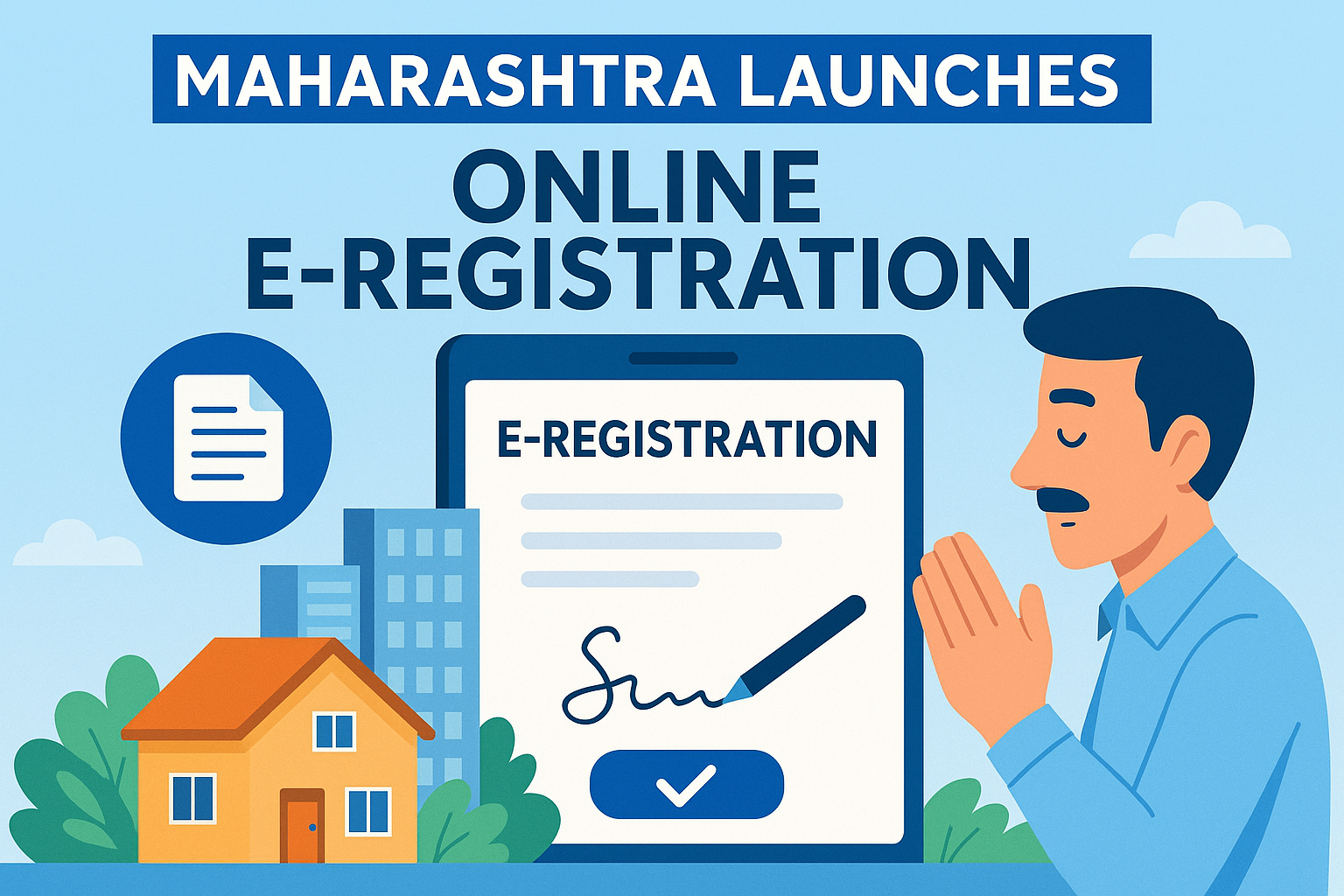
Maharashtra Launches Online E-Registration for Property Agreements: Hiranandani Panvel Becomes First Project
In a landmark reform aimed at digitizing property transactions and easing the process of real estate registration, the Inspector General of Registration (IGR), Maharashtra, in collaboration with the Department of Registration & Stamps, officially launched the Online E-Registration of Property Agreements on September 3, 2025. The Hiranandani Group’s Panvel real estate project has become the first to adopt this digital-first initiative, setting a new benchmark for the state’s housing and real estate sector.
A Game-Changer for Ease of Doing Business
The e-registration initiative is being hailed as a milestone in ease of doing business, transparency, and customer convenience. For decades, property buyers and developers had to physically visit Sub-Registrar Offices (SROs), often facing long queues, delays, and bureaucratic hurdles. This new system eliminates that dependence completely by digitizing the entire registration process.
Speaking on the occasion, officials from IGR Maharashtra emphasized that the reform aligns with the state government’s larger vision of “Digital Maharashtra”, where technology simplifies citizen services. By enabling digital workflows, the initiative is expected to boost confidence among domestic homebuyers and NRIs, who often struggle with the complexities of property registration.
End-to-End Digital Process
The most significant highlight of the new system is its end-to-end digital functionality. Under the online e-registration framework, every step of the process has been moved to a secure digital platform.
The workflow includes:
- Drafting of agreements online.
- Aadhaar-based e-KYC verification of both buyers and developers.
- Biometric authentication to establish identity beyond doubt.
- Online payment of stamp duty and registration fees.
- Final registration with a digitally signed copy of the agreement available instantly.
With this process, buyers no longer need to visit government offices, and developers can assist clients directly from their project sites.
Boosting Transparency and Trust
One of the primary goals of the initiative is to improve transparency in property transactions. The new digital system ensures that every transaction is tracked and monitored in real time by IGR Maharashtra. This eliminates the scope of manual intervention, reduces delays, and minimizes opportunities for malpractice.
The Inspector General of Registration, Maharashtra, called this move a “transformative step” towards bringing government services closer to citizens. “By leveraging digital technology, we aim to provide faster, transparent, and hassle-free registration services while maintaining the highest legal sanctity,” the official said.
Every agreement is securely stored and protected with encryption protocols, ensuring that sensitive personal and financial data remains safe.
First Adoption by Hiranandani Panvel Project
The Hiranandani Group, one of India’s leading real estate developers, became the first private company to implement the e-registration system at its Panvel project in Navi Mumbai.
Dr. Niranjan Hiranandani, Founder & Chairman of Hiranandani Communities, expressed pride in being the first mover. “This forward-looking reform will significantly reduce transactional friction for our customers. For both domestic and NRI homebuyers, the convenience of digital registration will enhance trust and make the entire process seamless,” he said.
Industry experts believe that Hiranandani’s adoption will encourage other developers to follow suit, accelerating the transition to paperless property registration across Maharashtra.
Key Benefits of Online E-Registration
The state government has highlighted multiple benefits of the online registration system, including:
- Convenience: Buyers can register agreements from home, office, or even directly at the developer’s site.
- Transparency: All transactions are digitally recorded and monitored by the government, eliminating manual loopholes.
- Speed: Instant approvals and immediate access to digitally signed agreements.
- Security: Aadhaar authentication, biometric checks, and encrypted data ensure the process remains legally valid and fraud-free.
- Eco-Friendly: As a paperless system, it reduces dependency on manual files and supports sustainable governance.
A Step Towards Digital Governance in Real Estate
This reform is not just about convenience; it marks a paradigm shift in governance. Real estate is one of the largest sectors in Maharashtra, with thousands of registrations occurring daily. Digitization will reduce government workload, increase efficiency, and ensure uniform processes across the state.
Additionally, the initiative is expected to cut down on time and cost for homebuyers, making the real estate sector more attractive to investors. It will also empower NRIs, who often face challenges while registering property agreements from overseas.
Future Outlook
The successful implementation of e-registration in the Hiranandani Panvel project is only the beginning. The state government plans to roll out the facility across all major real estate projects in Maharashtra. Over time, officials expect this reform to become the default mode of registration, with physical office visits becoming a rarity.
By integrating technology with governance, Maharashtra has taken a bold step towards ensuring citizen-centric services, reduced red tape, and increased trust in the housing sector. As more developers adopt this system, the state could soon emerge as a national leader in digital property registration.
Conclusion
The launch of the Online E-Registration of Property Agreements in Maharashtra represents a forward-looking reform designed to simplify, secure, and speed up the property registration process. With Hiranandani Panvel leading the way, the initiative showcases how technology can bridge the gap between government services and citizen needs.
For homebuyers, it means less stress, more convenience, and complete transparency. For developers, it means faster transactions and happier customers. And for the state, it means a stronger reputation as a progressive hub for real estate innovation and ease of doing business.




